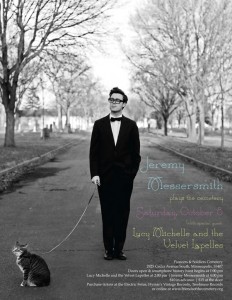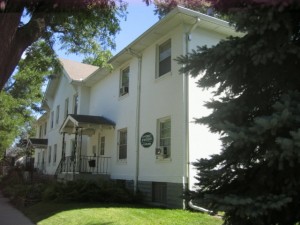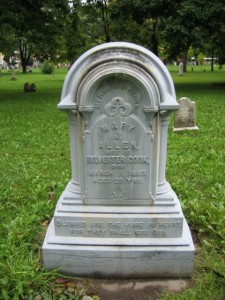‘Tales from Pioneers & Soldiers Cemetery’ Archives
It”'s the “The Cat”'s Meow””“ Jeremy Messersmith in Concert on “Graveyard Stage” at Cedar and Lake

By Sue Hunter Weir We are honored to have Jeremy Messersmith on the “Graveyard Stage” preceeded by Lucy Michelle and the Velvet Lapelles perform as part of a Cemetery Open House Gate Saturday, October 8th in conjunction with the Partners in Preservation Voting. Ticket sale proceeds will be used to continue our 1,853 foot fence restoration project. Jeremy”'s performance will include, without hesitation, songs from his most recent album, “The Reluctant Graveyard.” “The Reluctant Graveyard,” was named as one of the top ten albums of 2010 by National Public Radio”'s “All Songs Considered” and best local album by the Star Tribune. Some of the songs on “The Reluctant Graveyard,” including “Toussaint Grey,” were inspired by inhabitants of Minneapolis Pioneers and Soldiers Cemetery. Chris Riemenschneider, music critic for the Minneapolis Tribune, predicts that “this should be one of the most [...]
Amusement, Medical Innovation, and Transit Allied for Success

By Sue Hunter Weir The story of the Wonderland babies is as much of a crowd pleaser today as it was when Wonderland Park was in operation between 1905 and 1912. When Wonderland opened its gates in 1905, it was not just a big news story””it was a huge story. It wasn”'t just that having a modern amusement park was important to the city”'s image and sense of itself as the gateway to the Northwest, it was the effect that the park had on the city”'s infrastructure and economy. In 1905, for the first time, it became possible for Minneapolitans to take a streetcar from Hennepin and Lake to 31st Avenue and Lake without going through downtown. It was no coincidence that 31st and Lake marked the entrance to Wonderland Park. The following year, a newly constructed addition, the Selby-Lake streetcar line, provided easier access to the park for visitors from St. Paul. On busy days, streetcars ran as often as every thirty seconds to handle the crowds. In its first year of [...]
“White Bronze” Monument claimed to “Bridge” centuries

by Sue Hunter Weir-83rd in a Series When Sylvester Cook needed to buy a headstone for his wife, Mary, he wanted one that was beautiful and that would last. He took the somewhat unusual step of ordering a marker for her from the Monumental Brass Company in Bridgeport, Connecticut. Despite the company”'s name, the marker he bought isn”'t made of brass; it is made of zinc, a much less expensive metal that Monumental Brass, for marketing purposes, advertised as “White Bronze.” Between 1874 and 1914, Monumental Brass was the only company in the United States that manufactured cast zinc markers. They offered their customers hundreds of styles to choose from, and customized the markers with zinc plates that attached to one of their standard marker styles. Customers ordered the markers from local sales representatives or from catalogs at prices ranging from $2.00 for a small marker to $5,000 for a large monument. Monumental Brass Company seems to have learned [...]









